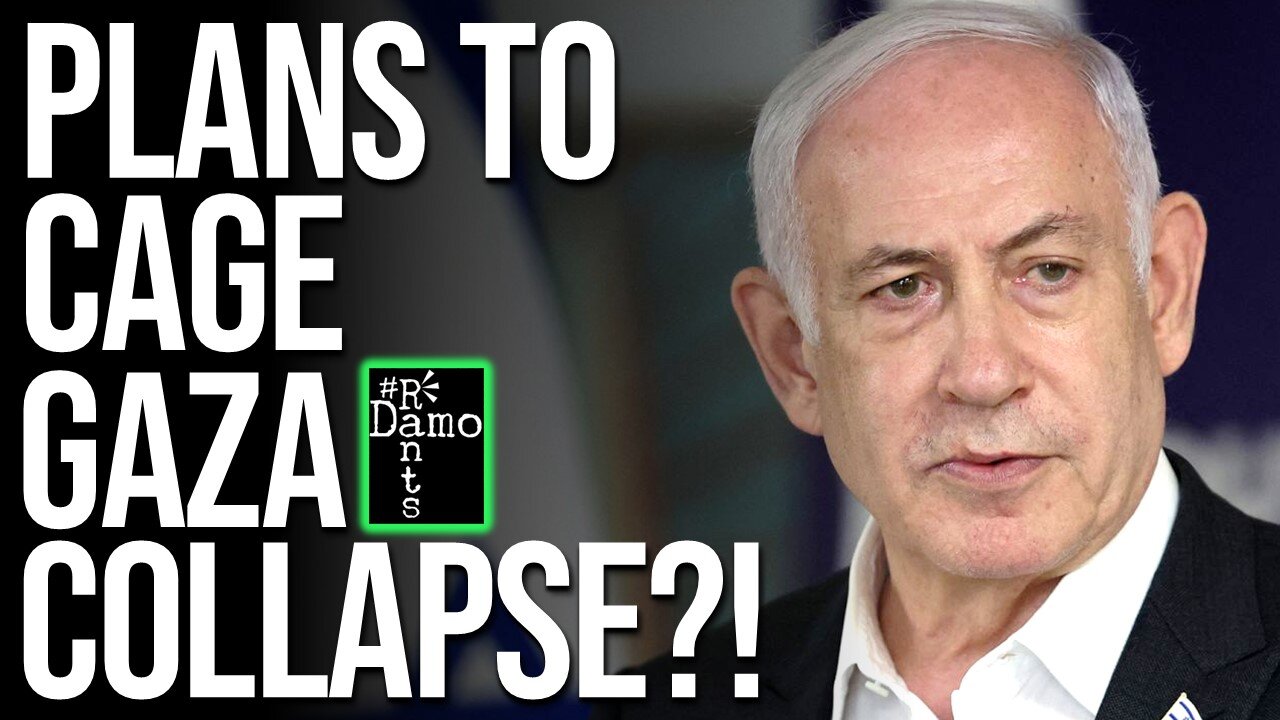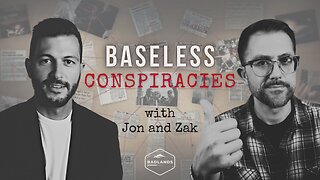Premium Only Content

Why Netanyahu’s Gaza Internment Plan Just Backfired Spectacularly
Right, so in the scorched and starved remains of Gaza, where over 58,000 Palestinians have now had their lives ended officially, but where fully 10% of the population cannot be accounted for and where entire neighbourhoods have been reduced to dust, Israel’s announcement of a "humanitarian city" in Rafah has been met with global alarm, not news to those of you who regularly tune in to this channel of course. As we ought to now know, it has been marketed as a safe zone for civilians with Orwellian absurdity, because this proposed internment facility is nothing more or less than concentration camp. But it may now no longer even happen. The entire plan has now seemingly collapsed under the weight financial infeasibility – Israel simply can’t afford the offensive thing and so vile is the concept, nobody else will pay for it either. But the damage has already been done. The very act of planning such a structure, and the political calculus behind it, has laid bare the genocidal logic that underpins Israel’s ongoing assault on Gaza, that has exposed the true meaning of Zionism to more and more people, horrified by what has been proposed if such a realisation hadn’t already come to them. But even if this plan now gets ditched on the basis of cost, its abandonment will still stand as a testament to the terrifying confirmation of the regime’s intent towards the people of Gaza.
Right, so earlier this month, Israeli media began reporting on a classified plan to construct a so-called "humanitarian city" in Rafah. According to documents later leaked to the German tabloid Bild, the project would involve the forced relocation of hundreds of thousands of Palestinians into a barbed-wire enclosure guarded by Israeli forces, monitored by drones, and lacking any path for civilian return. Once you go in, you don’t leave unless you leave Palestine and never return. The projected cost however has come in at between $2.7 billion and $4 billion. Quite the price tag for such an evil construct.
The language used by Israeli officials was clinical and bureaucratic. Euphemisms such as "safe zones," "transit areas," and "staging grounds" masked the brutality of what was actually being proposed here: the permanent removal of Palestinians from their homes under the guise of shelter and safety, Yes, tell that to those who tried to get food from a GHF aid hub never to return, or those kids killed in a ‘technical error as Israel put it, trying to get water. What Palestinian in their right mind would trust Israel’s word about safety?
The leaked documents described a highly regimented structure: fenced perimeters, biometric surveillance, controlled aid deliveries, and designated containment zones segregated by age and gender. No provision was made for freedom of movement, employment, or political representation. Under international law—specifically Article 49 of the Fourth Geneva Convention and the Rome Statute of the ICC—such forced relocation and containment, under military occupation, constitutes both a war crime and a potential act of genocide in and of itself.
Yet despite the insane branding, the Rafah plan was never widely accepted within the Israeli security establishment. According to reporting from Ynet, the IDF Chief of Staff Eyal Zamir, and other senior military officials privately opposed the idea, warning that the plan would drain resources from military operations, including hostage recovery efforts. At least somebody in the Israeli ranks has remembered them still. The military’s refusal to endorse the plan has created an internal rift that had already to an extent paralysed decision-making on this plan.
Further destabilising the project and this is the far bigger issue it seems, is its staggering price tag. Estimates ranged from 10 to 15 billion shekels, with no clarity on funding sources whatsoever. Israel’s economy, already under strain from the war and international boycotts, could not justify such an expense. As Swiss outlet Bluewin and The Cradle have reported, the government faced pushback from both the finance ministry and its own civil servants. The plan was fiscally untenable. Defence planners warned that the proposed relocation site would be a permanent logistical and legal liability, opening the state to international lawsuits and reinforcing accusations of genocide, so the factored in costs would actually soar far higher.
Privately, some officials admitted that no ally—including the United States, European Union, or even Gulf states—would be willing to foot the bill for what was effectively a population internment zone. Meanwhile, the Donald Trump administration has offered rhetorical cover but no financial aid. Trump’s “America First” agenda has made clear that Israel would be on its own in funding large-scale humanitarian infrastructure.
What truly derailed the Rafah plan, however, was the leak about it from inside Netanyahu's inner circle. Jonatan Urich, a key adviser and former Likud campaign director, provided details of the plan to German media. He has since been indicted for transmitting classified information and endangering state security. As Reuters and AP have now confirmed, Urich faces criminal prosecution and his case has become a flashpoint in the wider internal collapse of Netanyahu's war cabinet.
The leak not only exposed the plan’s contents, but revealed the deep internal divisions within the Israeli government. It signalled that even Netanyahu's closest advisers were alarmed by the implications of the policy. Given the history Netanyahu is so fond of invoking in regards to the Holocaust, he evidently weaponises it, places his own depravity and hatred of Palestinians first, but literal concentration camps being proposed? Clearly that’s too much for some. Urich's actions reflect a growing internal reckoning within the Israeli state, where civil servants, intelligence officers, and military officials are evidently unwilling to be complicit in crimes of that magnitude.
Urich’s decision to leak the plans therefore, and the subsequent legal proceedings, have sent shockwaves through Israel’s political establishment. It illustrates a growing belief among insiders that Netanyahu’s leadership is not only reckless but legally toxic. The incident is reminiscent of internal ruptures in other authoritarian regimes where once-loyal operatives begin distancing themselves to avoid future prosecution. That Israel’s own elite now fear the possibility of future trials at The Hague for instance, speaks volumes.
Despite the camp’s apparent cancellation, the destruction of Rafah to make way for it continues unabated. Reports from Al Jazeera and Press TV, confirm that Israeli bulldozers and airstrikes have flattened large sections of southern Gaza. If these demolitions are no longer being framed with certainty as preparation for this concentration camp, then they are instead taking place with no declared purpose, suggesting that the erasure of Palestinian homes and infrastructure is just as much the purpose now.
This method of destruction without reconstruction is a longstanding Israeli strategy: render Palestinian life unviable and then blame the victims for their own displacement. Even without a formal enclosure, Rafah is being transformed into an uninhabitable wasteland. Israeli forces have blocked aid convoys, targeted civilians at water collection points, and created famine-like conditions to force Palestinians into flight.
What is unfolding in Rafah now is ethnic cleansing by other means. The failure to build the camp has not altered the underlying objective: the elimination of Palestinians from Gaza. Instead of centralised internment, Israel is pursuing the continuation of distributed containment, isolation, and induced starvation.
The logic remains genocidal, but the execution just remains more diffuse. Palestinians are herded into ruins, denied access to clean water, food, and medicine, and then offered no way out except exile or death. This is not a war against Hamas; it is a war against survival itself for everyone in the enclave. Gaza’s population is being reduced not by resettlement but by attrition.
In this context, terms like “safe zones” and “humanitarian corridors” are not merely misleading—they are actively being weaponised. Aid distribution is turned into a baited trap. Humanitarian infrastructure is used to create targets. The absence of a formal camp allows Israel to escape the visual symbolism of barbed wire and towers now as we were all thinking—but the moral reality remains indistinguishable, its the same, the same mindset has been revealed even if the camp now doesn’t get built.
The Rafah plan’s exposure has significantly escalated Israel’s legal peril. Already under investigation by the International Court of Justice for war crimes and crimes against humanity, Israel now faces credible allegations of genocide. The leaked blueprints offer compelling evidence of premeditated intent, which is a core requirement under the Genocide Convention.
Legal scholars have noted that even planning a concentration camp—without executing it—can constitute a preparatory act of genocide. This is especially true when the plan includes mechanisms for internment, control of food and water, and indefinite containment. The precedent from other international tribunals, including the The International Criminal Tribunal for the former Yugoslavia and the International Criminal Tribunal for Rwanda, affirms that intent and infrastructure design are admissible evidence in proving genocidal purpose.
European nations may now also pursue universal jurisdiction cases, as Spain, Belgium, and Colombia have done in recent months. The risk for the likes of Benjamin Netanyahu, Israel Katz, and Bezalel Smotrich is not just reputational—it is legal, and potentially existential.
The exposure and subsequent apparent failure of the Rafah plan has also triggered a collapse in Israel’s global propaganda narrative—or hasbara. Where once the state could rely on euphemisms and sympathetic media framing, it now finds itself widely accused of pursuing genocide despite all of that, it is no longer cutting through.
The leak turned the term “humanitarian city” into a punchline. The visual language—barbed wire, drones, and segregation—was impossible to spin. The public denunciation of the plan by the likes of former Israeli PM Ehud Olmert, international media scrutiny, and the raw testimonies of Palestinians telling stories of their friends and families being buried beneath tents have obliterated Israel’s PR strategy.
More profoundly, it signalled a shift in public consciousness. The liberal Zionist illusion—that Israel’s military actions are defensive, proportional, and humane—has been irreparably shattered. People are no longer persuaded by the narrative of a besieged democracy. They see a militarised ethnocracy enacting settler-colonial domination.
The Rafah plan also exposed the quiet complicity of Israel’s allies. The United States under Trump, provided rhetorical support but refused to finance the project. The European Union issued tepid statements while continuing arms trade and diplomatic cover. Egypt has kept sealed the Rafah border but made no public condemnation, implicitly endorsing a strategy of starvation and containment.
If the camp plan does end up officially abandoned, Israel’s strategy will simply continue moving toward more decentralised and deniable forms of population control. Expanding the buffer zones, demolishing infrastructure to prevent resettlement, and leveraging famine still as a weapon.
In the absence of fences, Israel now uses fragmentation, siege, and starvation to accomplish the same goal. The blueprint has changed. The crime has not.
If the Rafah concentration camp does get cancelled, it still does not signal a reversal of Israeli policy. On the contrary, it will continue in other ways and means. The logic of ethnic cleansing, once hidden behind euphemism, is now pursued openly and without apology.
The camp was never about humanitarian protection; it was a blueprint for permanent displacement. Its possible cancellation is not a reprieve, because that will still be the plan.
In a further blow to Israel’s propaganda war though, one of the oldest Zionist institutions on Earth has just been canned in Canada, as the charity status of the Jewish National Fund –we plant trees to hide war crimes – just got revoked and may now set a precedent elsewhere in the world too, not least in the US of all places right now as AIPAC get a similar shot across the bows. Get all the details of that story in this video recommendation here as your suggested next watch.
Please do also hit like, share and subscribe if you haven’t done so already so as to ensure you don’t miss out on all new daily content as well as spreading the word and helping to support the channel at the same time which is very much appreciated, holding power to account for ordinary working class people and I will hopefully catch you on the next vid. Cheers folks.
-
 1:50:00
1:50:00
The Michelle Moore Show
17 hours ago'Prayer Points...President Trump's Economy, Parental Warnings on 6-7 Demonic Ritual, Islamist Leader Reveals the Goal of Islam Ideology, and more' Lt. Mark Taylor The Michelle Moore Show (Nov 10, 2025)
12.4K32 -
 LIVE
LIVE
Lofi Girl
3 years agolofi hip hop radio 📚 - beats to relax/study to
118 watching -
 14:12
14:12
BlabberingCollector
1 day agoHBO Show Update, Audible Full Cast Ensemble Updates, Wizarding World Quick Hits!
62.6K3 -
 2:35:48
2:35:48
FreshandFit
13 hours agoShe Watched Our Show, NOW She's Happily Engaged
232K71 -
 1:49:19
1:49:19
Badlands Media
12 hours agoBaseless Conspiracies Ep. 158: Trump’s World Order, Israel’s Secrets & the MAGA Infiltration
77K23 -
 2:54:31
2:54:31
TimcastIRL
7 hours agoIllegal Immigrant ARRESTED After Shooting At DHS, War ERUPTS In Chicago
294K143 -
 5:23:34
5:23:34
Drew Hernandez
1 day agoMARK LEVIN CRASHES OUT & TRUMP SEEKS HOUSING CRISIS SOLUTION
27.5K23 -
 6:29:18
6:29:18
SpartakusLIVE
9 hours ago#1 King of Content leaves your Monday UTTERLY MOTIVATED
50.7K1 -
 2:47:40
2:47:40
Barry Cunningham
10 hours agoBREAKING NEWS: WATCH PARTY WITH PRESIDENT TRUMP ON THE LAURA INGRAHAM SHOW (AND MORE NEWS)
165K44 -
 2:36:50
2:36:50
Blabs Games
16 hours agoLet's Get Those 5 Stars! Jurassic World Evolution 3 Playthrough #7
66.9K5